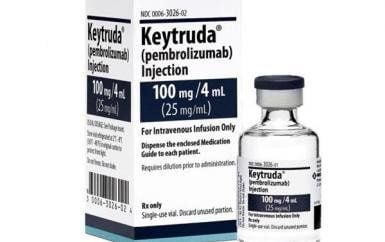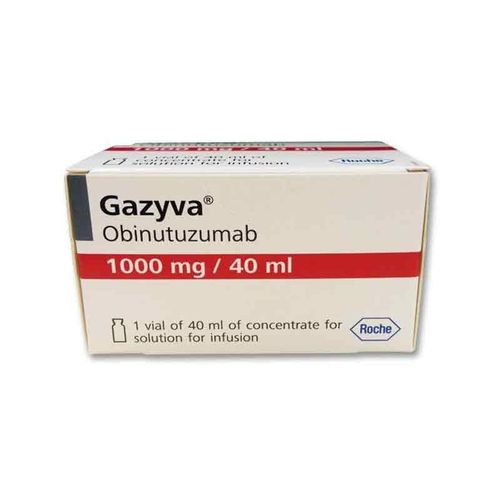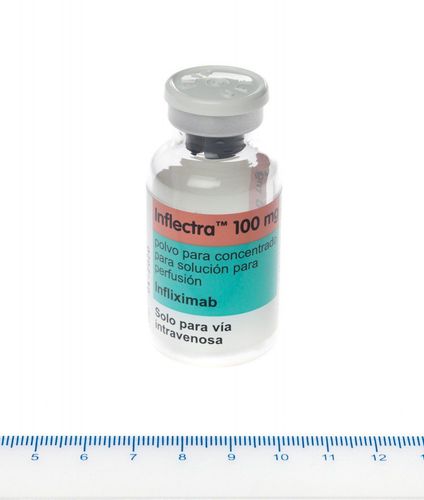This is an automatically translated article.
Monoclonal antibodies are a newly developed cancer treatment. One of them is Amivantamab in Rybrevant. So what disease does Rybrevant treat and how should it be used?
1. What disease does Rybrevant treat?
Amivantamab is the main active ingredient in Rybrevant. This is a laboratory-made monoclonal antibody that binds to specific targets of certain cancer cells. The antibodies in Rybrevant trigger the body's immune system to attack the cell it binds to, resulting in the immune system killing the cancer cell. These antibodies also work by a variety of mechanisms, including stimulating the immune system to destroy cells, and directly blocking or inhibiting certain processes necessary for cell growth.
Amivantamab is a monoclonal antibody that works on certain types of cancer that have mutations in a protein called epidermal growth factor receptor (EGFR) and epithelial-mesenchymal transition (MET). EGFR is a protein that is abnormally overexpressed in many cancers. Rybrevant works specifically on tumors that have the EGFR exon 20 insertion mutation. These mutations are identified through several FDA-approved blood tests prior to starting treatment with Rybrevant.
2. How to take Rybrevant
Rybrevant is administered by intravenous infusion (may be slow intravenous injection or intravenous infusion). Dosage of Rybrevant depends on the patient's weight and the frequency of use as prescribed by the doctor. Before starting the first dose of Rybrevant, the patient will be prescribed medications such as Diphenhydramine (Benadryl), Acetaminophen (Tylenol) and Steroids to prevent infusion reactions. With the next doses, whether the patient is indicated to use the above drugs or not depends on the doctor's assessment.
3. Rybrevant . drug side effects
Patients can take a number of measures to control the side effects of Amivantamab, so it is necessary to talk with the treating doctor to find the most suitable one.
Some common side effects of the drug Rybrevant :
Hepatotoxicity : Rybrevant can cause liver toxicity , requiring the doctor to have a monitoring plan through liver function tests . Patients should notify their doctor if they notice signs of liver toxicity such as jaundice, yellow eyes, dark or brown urine, or right upper quadrant pain...; Skin rash: Some patients may develop a rash, scaly skin, or red bumps with itching. This condition can be confused with acne, but the use of acne medication is neither necessary nor advisable. Instead, apply an alcohol-free moisturizer to your skin and lips, and avoid moisturizers with fragrances or fragrances. Your doctor may recommend a topical medication if the itching is bothersome. If the skin is cracked or bleeding, remember to keep the area clean to avoid infection. Some skin management tips for Rybrevant users include:
Use alcohol-free lotion or emollient at least 2 times a day, including after bathing; Limit sun exposure during and after 2 months of treatment with Rybrevant due to the risk of worsening the rash or causing severe skin burns. Patients should use sunscreen with SPF 30 or higher and wear a hat, sunglasses to protect the head and face from the harmful effects of the sun; Shower with cool or warm water, not too hot, and pat the skin dry; Use soaps, perfumes and laundry detergents that do not contain alcohol, fragrances or dyes; Wear gloves when washing dishes, doing housework or gardening; Add plenty of water and try not to scratch or rub your skin. Side effects associated with infusion of Rybrevant include chills, fever, low blood pressure, nausea and vomiting. Patients can take Acetaminophen (Tylenol) and Diphenhydramine (Benadryl) and Steroids, before the infusion to help prevent these reactions.
Hyperglycemia: Rybrevant may increase blood sugar in patients with and without co-morbidities of diabetes. Your doctor will monitor your blood sugar periodically. If you have symptoms of increased thirst, increased urination or hunger, blurred vision, headache or fruity breath, notify your doctor. Patients with diabetes should closely monitor their blood sugar and report it to their doctor if it is abnormally high.
Muscle or joint pain: Your doctor may recommend medications and other strategies to help relieve pain.
Kidney problems: Rybrevant can cause kidney problems, including increased creatinine levels. The doctor can monitor the patient using blood tests. Patients should notify their doctor if they notice a decrease in urine output, blood in the urine, swelling of the ankles, or loss of appetite.
Cough and/or difficulty breathing: Rybrevant may lead to a new, worsening cough or difficulty breathing. Patients should call their doctor if this effect occurs.
Nausea and/or vomiting: Talk to your doctor about medications to control nausea and vomiting. In addition, you can change your diet to avoid things that may worsen symptoms (such as foods that are difficult to digest or that are greasy, spicy, or acidic, such as lemons, tomatoes, and oranges). ...).
Call your doctor if you cannot infuse Rybrevant continuously for more than 12 hours or feel light-headed or dizzy at any time.
Fatigue is very common during cancer treatment and often does not improve with rest. During cancer treatment and for some time afterward, patients may need to adjust their daily activities to manage fatigue, schedule rest for the day, and conserve energy for important activities. than. Some other ways to reduce fatigue include light exercise such as walking or perhaps consulting your doctor for helpful tips for dealing with this side effect.
Decrease in white blood cell count: White blood cells (WBCs) are important to fight infections, during treatment with Rybrevant, the white blood cell count may drop low, putting the patient at high risk. infected. Patients should notify their doctor immediately if they have a high fever (temperature higher than 38 degrees Celsius), sore throat or cold, difficulty breathing, cough, burning when urinating.
Electrolyte abnormalities: Rybrevant may affect the concentration of electrolytes (such as potassium, magnesium, sodium...) in the body. This requires periodic electrolyte testing during treatment with Rybrevant. If electrolyte levels are too low, your doctor may prescribe specific supplements by intravenous or oral route.
Reproductive concerns of Rybrevant :
Exposure to Rybrevant to an unborn baby can cause birth defects, so patients should not become pregnant or father a child while taking Rybrevant ; Effective birth control is required during treatment and for at least 3 months after stopping treatment with Rybrevant; At the same time, patients should not breast-feed during treatment and for at least 3 months after the last dose of Rybrevant. With important information about the drug Rybrevant, it is hoped to help the process of use in patients be effective, safe and improve the health of patients.
Please dial HOTLINE for more information or register for an appointment HERE. Download MyVinmec app to make appointments faster and to manage your bookings easily.













